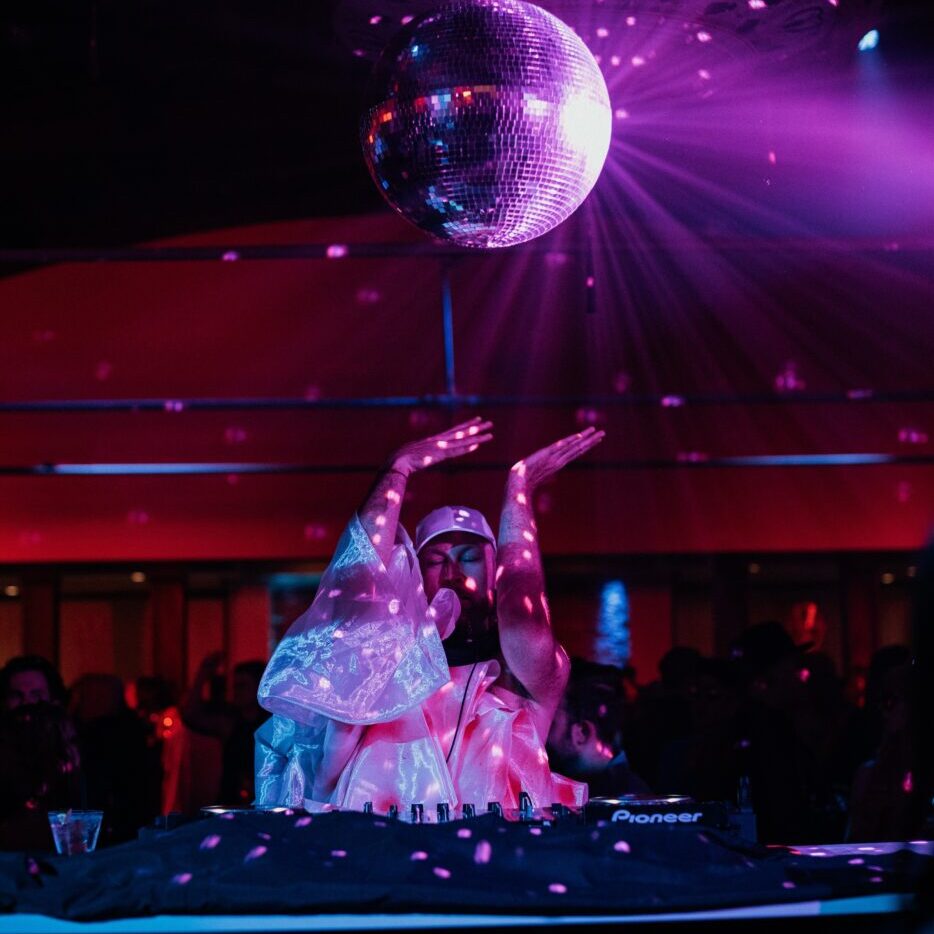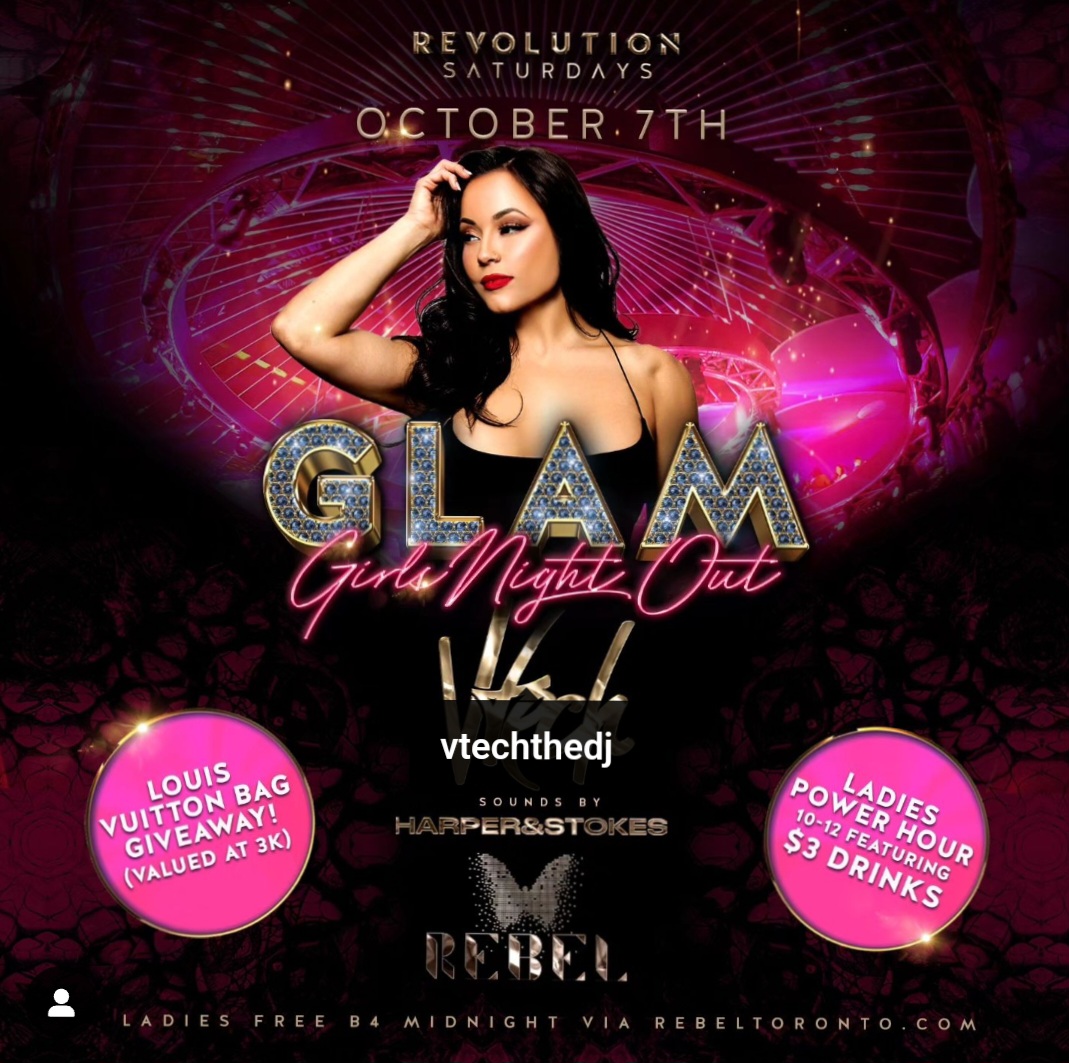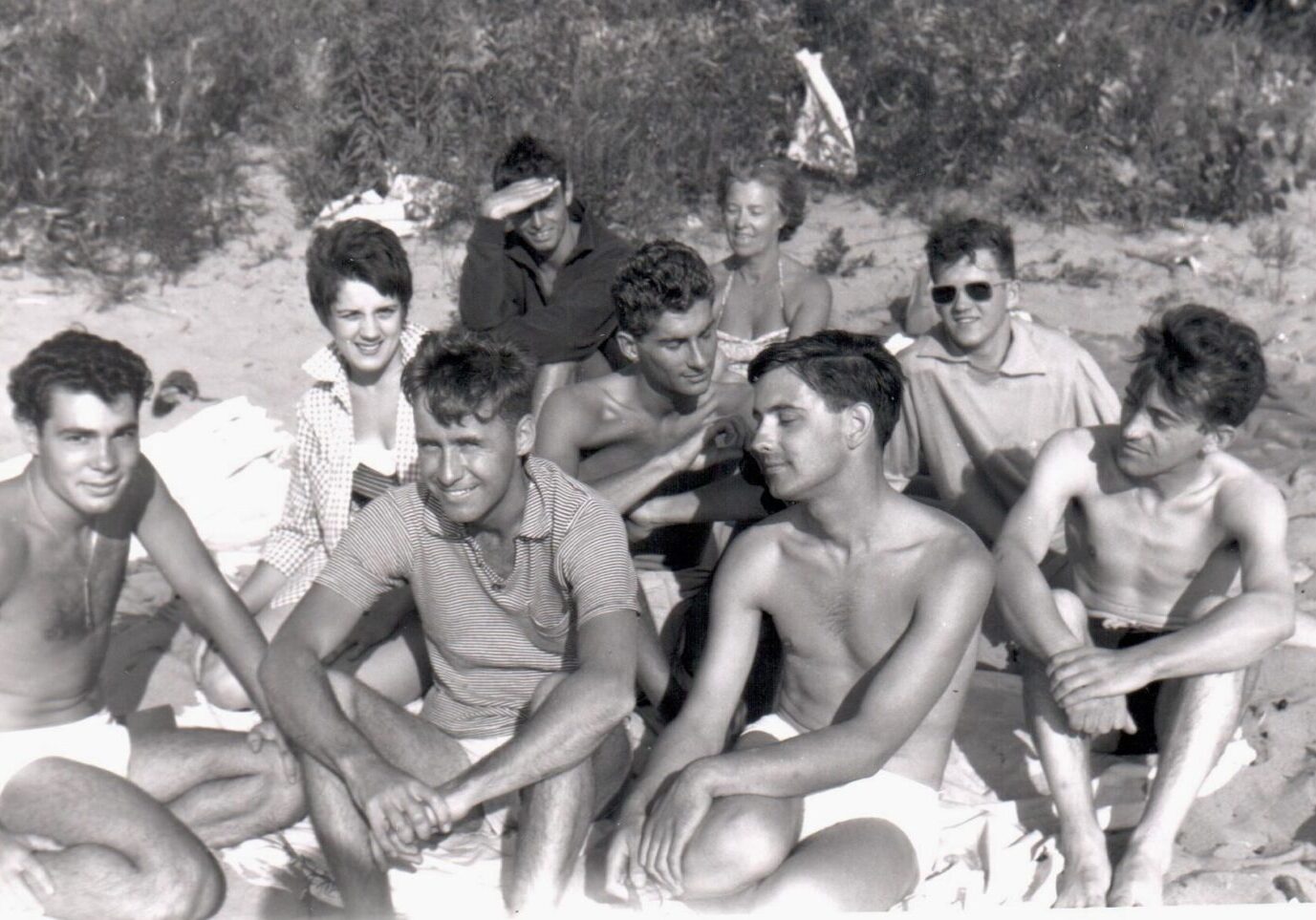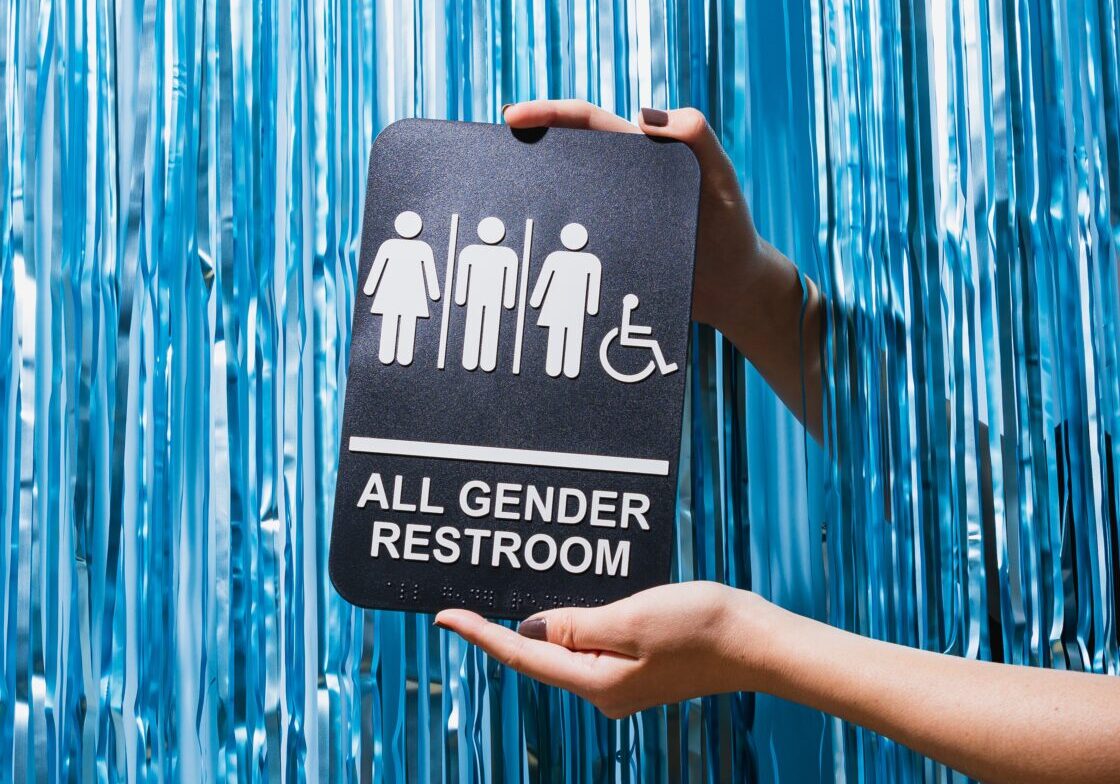THE GREEN LINE
ORIGINAL STORY
Mainstream Toronto nightlife is very ‘straight.’ How can we make it safer for queer communities?
Gender-based practices are so entrenched in our city’s nightlife culture that they’re rarely questioned, according to critics.

PHIL VILLENEUVE, A TORONTO-BASED DJ AND EVENT ORGANIZER, WORKING AT A CLUB.


ISABEL ARMIENTO
Book lover and freelance journalist currently living in the Annex. Works as the editorial director of Aardvark Book Club. Curled up with a good book or in a mosh pit (there’s no in-between).
October 16, 2023
“Hi,” TikTok user @cabbagerollbaby says while smiling sarcastically at the camera.
“I’m gay and queer and I like to wear feminine clothes sometimes.”
In the video, he goes on to recount his experience at Isabelle’s, a newish bar on King Street West that opened in December 2022. Although the women with him all carried their purses in without a problem, he was stopped and told that, according to Isabelle’s dress code, men weren’t allowed to bring in purses. If the TikToker wanted to enter, he’d have to check his bag or lose the $20 cover he already paid.
“They have a dress code or style guide for men and for women as if this is 1949,” @cabbagerollbaby says while holding up a small black purse.
@cabbagerollbaby ISABELLE’S NIGHT CLUB, KING ST W TORONTO ON — DISCRIMINATES AGAINST QUEER PEOPLE: As a gay queer person living in a city as diverse and progressive as Toronto, I typically don’t think twice about facing discrimination for how I present myself— until last night, when I joined some friends to check out a new club called ISABELLE’S. I was quickly made aware that my queerness was unacceptable, and not allowed at Isabelle’s. #toronto #nightlife #queer #discrimination ♬ original sound - TOMY UNIVERSE
Posted in early August, the video quickly went viral, garnering thousands of likes and hundreds of comments. Other TikTok users were quick to chime in with similar experiences.
“Happened to me, too! I gave my friend my entire bag, and she got in no problem with TWO bags,” @bblwoods wrote. “They’re trash there.”
Meanwhile, @gay_interrupted wrote, “Typical King street BS. Baro turned me and a friend away cuz we were wearing CROP TOPS when other women were, too.”
As the comments on this video make clear, many young people were surprised by what they describe as outdated gender-based policies continuing to exist in a city as apparently diverse and inclusive as Toronto.
Most of the city’s biggest nightclubs still offer different pricing options for men and women, and some, like Isabelle’s, enforce a strict gender-based dress code. Rebel in the Port Lands, for example, explicitly states “no man bags” on its website. These policies fail to take gender diversity into account, which critics say are exclusionary to non-binary people.

POSTER ADVERTISING AN EVENT AT REBEL, A NIGHTCLUB IN THE PORT LANDS.

Let’s consider a sampling of Toronto’s most popular nightclubs: Rebel, Door Three, Toybox, 44 Toronto, Ultraviolet, Call Her Juliet, Lost and Found, and Nest. Of these eight, seven require patrons to disclose their gender to get on the guestlist, but only offer the options “male and female.” They also offer free cover for “ladies” before a set time, which means pricing is determined according to one’s participation in the gender binary.
These practices are so entrenched in Toronto’s nightlife culture that they’re rarely questioned. But according to the TikTok users commenting on @cabbagerollbaby’s video, as well as many members of Toronto’s 2SLGBTQI+ communities and their allies, mainstream nightlife in Toronto remains a hostile place for many queer, trans and gender non-conforming people.
Jaeden Isidro, 29, a queer and nonbinary partygoer, calls mainstream Toronto nightlife “an awful experience” and sticks to explicitly LGBTQ-friendly venues. “I now avoid clubs that aren’t typically frequented by the queer community,” they said.

ISABELLE'S NIGHTCLUB AT 548 KING. ST. W. IN THE FASHION DISTRICT.

Designated queer spaces in Toronto are few and far between — and nightlife is no exception. These spaces have been protecting queer Torontonians for decades, clandestinely operating since before homosexuality was legalized in Canada in 1969. Hanlan’s Point Beach, for example, was the site of the first public queer event in Toronto in August 1971, though gatherings of local 2SLGBTQI+ community members existed there as far back as the 1950s.
“Before that, people met, you know, in private parties and say, on a beach like [Hanlan’s], but it was all often undercover,” local historian Ed Jackson told The Green Line. It wasn’t very public because people could take risks, They would be subject to stigma.”
With soaring rent prices and a recent rise in anti-2SLGBTQI+ sentiment, including protests against “gender ideology” in schools last month, options for queer clubgoers are limited.
“Queer public space is a very rare thing, and making sure that we can honor and preserve that and make sure that people can still use it is very important, especially now more than ever,” said Travis Myers, co-founder of Friends of Hanlan's, an advocacy group focused on maintaining the history of the beach.

A GROUP OF FRIENDS MEETS ON HANLAN'S POINT BEACH IN THE MID-1950S.

Phil Villeneuve, a Toronto-based DJ and event organizer, laments the decline of the Church-Wellesley Village, which has been a hub for queer nightlife in Toronto since the mid-1980s. This is especially worrying considering the recent rise in anti-2SLGBTQI+ sentiment across Canada; in 2021 alone, hate crimes against queer people rose by 64 per cent.
“The Village here in Toronto is in grave danger,” Villeneuve said, adding that the young, edgy queers who once defined the scene are slowly being pushed out by gentrification. “We’re now living in a world where we don’t have many official places to go party and dance safely.”
Isidro says they’re also becoming increasingly uncomfortable in mainstream clubs, especially since much of Toronto’s nightlife is built around heteronormativity, so traditionally “straight” spaces can feel exclusionary or even unsafe for queer, trans and gender non-conforming people.
“As someone who doesn’t fit the binary, and especially since starting my medical transition, I don’t feel comfortable going into the women’s bathroom because it’s dysphoric and triggering,” they explained. “But I also don’t feel comfortable going into the men’s washroom because I get weary of my safety around straight cis men.”
Ideally, for Isidro, there would be a gender-neutral bathroom option, but many of Toronto’s mainstream clubs –– including Pizza Wine Disco, Rebel, 44 Toronto and Call Her Juliet, just to name a few — don’t offer one.

SIGN INDICATING GENDER-NEUTRAL BATHROOMS.

Due to the lack of queer-specific venues, event organizers like Villeneuve have had to get creative with where they host engagements. Some of his recent events have included STIFF, Toronto’s annual queer TIFF party hosted at Mahjong Bar, and Tapette, a queer and French music event hosted at Bambi’s, both of which are non-queer-specific venues located in the Trinity Bellwoods area.
“A lot of venues are like, yes, we want gay people here. They love to drink, they love to party…but it’s way more nuanced than that,” Villeneuve said, adding that it’s his job to ensure queer patrons are offered a genuinely safe space. “You have to have multiple meetings with these people to talk about the dos and don’ts of how this event will work.”
Villeneuve zeroed in on a few important conversations he needs to have before being comfortable enough to host a queer event in a “straight” venue. “One of the first things is to ask if it’s okay that we put signs up on the washrooms that make them gender neutral for everyone,” he explained.
Another priority is ensuring that front-of-door staff are on the same page about pronouns and consent. “I think straight people are used to the pat down — this aggressive, super macho way of entering a club,” Villeneuve said.
He adds that straight people are also used to “ladies in for free,” but in queer spaces, all of that is thrown out. “For us, it’s all about everyone walking in here equal.”

THE STANDARD DRESS OF CLUBGOERS AT REBEL NIGHTCLUB.

To remedy this, Villeneuve often hires private security companies, such as Berry Safe, a female, 2SLGBTQI+ and BIPOC-led security company. “There’s just a lot of unnecessarily domineering male energy…when it comes to working security,” said Gizelle “G” Pajaro-Amurao who co-runs Berry Safe with Janeka “Neekz” Berry.
Pajaro-Amurao, who’s in their early twenties, says the presence of queer front-of-door staff is an important part of creating safe spaces since it signals to patrons that the venue is genuinely queer-friendly. “That gives them a sense of familiarity,” they explained.
Visibility is something Berry Safe has “really prioritized and centred,” Pajaro-Amurao added. That’s why, when overseeing queer events, the company often calls on its network of queer security guards to work the front door.
What’s more, these security guards tend to be aware of the specific dangers that queer people might face on a night out. “Our lived experience allows us to know what we’re looking for and what would make us feel safe,” Pajaro-Amurao explained.
Just because an event is advertised as queer, doesn’t mean the venue’s security team is aware of the specific dangers queer people face during a night out. “They’re not thinking about whether queer people on a straight street might be harassed or even attacked, or whether they’ll be safe getting home,” they said.

JANEKA "NEEKZ" BERRY (PICTURED LEFT) AND GIZELLE "G" PAJARO-AMURAO (PICTURED RIGHT) WORKING AS SECURITY AT PARTY 6000, A LOCAL TORONTO EVENT RUN BY MAKEWAY.

Another practice that’s becoming common among queer event organizers is hiring designated “safety teams.”
“These are folks who circulate the party wearing an armband or vest to signal that if anyone needs help, they can help,” Villeneuve said. “They know to look for signs of overdose, or of people just being lost or freaked out.”
This helps ensure that patrons feel genuinely protected since “you can’t just say, ‘This is a safe space,’ anymore.…you need to have this real feeling of community.”
This need for belonging is part of the reason why Villeneuve created YoHomo, Toronto’s biggest resource for queer and queer-friendly events. As designated queer spaces across Toronto dwindle, he says it’s become increasingly important to cultivate queer communities, while also ensuring that the people organizing events are well-versed in what a genuinely safe queer space looks like. This may include ensuring the venue offers gender neutral bathrooms, rejecting binary-coded language in marketing materials or hiring queer front-of-door staff.
Villeneuve emphasizes that mainstream nightlife in Toronto can be isolating and disparate, without much sense of community or care. But for him, queer nightlife actively pushes back on this. “The biggest difference between queer nightlife and traditionally straight nightlife is that we’re a family,” he said.
With files from Julia Lawrence.
Fact-Check Yourself
Sources and
further reading
Don't take our word for it —
check our sources for yourself.